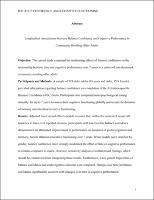Please use this identifier to cite or link to this item:
https://hdl.handle.net/20.500.12202/8907| Title: | Longitudinal associations between balance confidence and cognitive performance in community-residing older adults |
| Authors: | Holtzer, Roee Weinberger, Andrea Feldman, Jonathan M. Foley, Frederick Cole, Jeffrey Kominsky, Rebecca Kraut |
| Keywords: | Clinical psychology Balance Cognition Fear-of-falling Memory Mobility Older adults |
| Issue Date: | Nov-2022 |
| Publisher: | Yeshiva University |
| Citation: | Kraut, R. K. (2022, November). Longitudinal associations between balance confidence and cognitive performance in community-residing older adults (Publication No. 30247946) [Doctoral dissertation, Yeshiva University]. PDTG |
| Series/Report no.: | Ferkauf Doctoral Dissertations;Publication No. 30247946 |
| Abstract: | Objective: The current study examined the moderating effects of balance confidence on the relationship between time and cognitive performance over 7 years in a cohort of non-demented, community-residing older adults. ¶ Participants and Methods: A sample of 519 older adults (65 years and older, 55% female) provided information regarding balance confidence via completion of the Activities-specific Balance Confidence (ABC) Scale. Participants also completed neuropsychological testing annually, for up to 7 years, to assess their cognitive functioning globally and in specific domains of memory and attention/executive functioning. ¶ Results: Adjusted linear mixed effects models revealed that, within the context of an overall tendency to learn over repeated sessions, participants with low baseline balance confidence demonstrated an attenuated improvement in performance on measures of global cognition and memory, but not attention/executive functioning over 7 years. When models were stratified by gender, balance confidence more strongly moderated the effect of time on cognitive performance in females compared to males. However, sensitivity analyses revealed mixed findings, which should be considered when interpreting these results. Furthermore, when growth trajectories of balance confidence and each cognitive outcome were compared, changes over time in balance confidence significantly covaried with changes over time in cognitive performance.¶ Conclusion: Findings from the present study suggest that those with lower balance confidence have worse cognitive outcomes compared to those with higher balance confidence and that those with greater decreases in balance confidence over time also show less improvement in cognitive performance over repeated sessions. As balance confidence is a modifiable risk factor for gait impairment, treated successfully with balance-based exercises and psychotherapy, it may be a useful marker to target for treatment within the clinical setting. Given the known associations between mobility decline and cognitive decline, future studies might investigate the potential longitudinal benefits of improved balance confidence on cognitive functioning. |
| Description: | Doctoral dissertation, PhD / Open Access |
| URI: | https://hdl.handle.net/20.500.12202/8907 https://ezproxy.yu.edu/login?url=https://www.proquest.com/dissertations-theses/longitudinal-associations-between-balance/docview/2815158002/se-2?accountid=15178 |
| ISBN: | 9798379501457 |
| Appears in Collections: | Ferkauf Graduate School of Psychology: Doctoral Dissertations |
Files in This Item:
| File | Description | Size | Format | |
|---|---|---|---|---|
| 2023.01.01 Kraut.Dissertation.Revisions.pdf | 747.8 kB | Adobe PDF |  View/Open |
This item is licensed under a Creative Commons License

